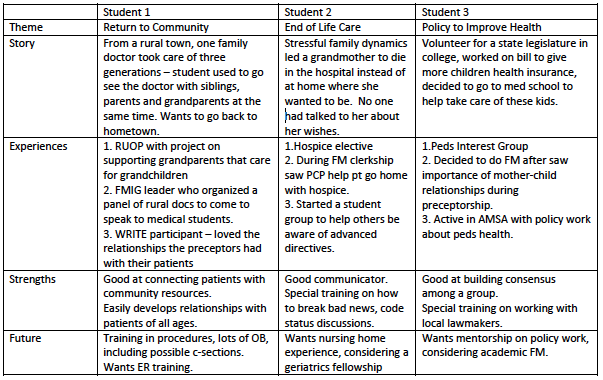The best personal statements are memorable. They paint a picture in the mind of the reader and tell a story about who you are, how you got here, and where you want to go. The personal statement is vitally important because it is frequently used to help determine who gets interviewed and ranked.
Overarching theme:
Look over your CV and think about the experiences before and during medical school that inform what kind of family physicians you will become. Often there is a common thread that holds together even the most disparate of experiences – this common thread is usually one of your core values as a person. Identify this theme and write your personal statement so the reader could easily verbalize this theme in one sentence after reading your statement.
Experiences to highlight:
Use your experiences to give programs an idea of who you are. Be specific – talking about the aspects of care that you like in Family Medicine is good, but it’s even better when programs can see how your personal experiences reinforce aspects of family medicine that resonate with you as a person.
It’s okay to include patient vignettes and talk about your accomplishments, but be sure to relate it back to yourself. How did the experience impact you? What did you learn about yourself? How will the experience make you a better family physician? What about the experience demonstrates your commitment to the discipline of family medicine, your ability to work with others, your ability to work with patients?
Choose one experience and tell a story. This is a good way to open your statement, to develop your theme and make it memorable.
Commitment to specialty:
Talk about why you are choosing family medicine. Programs want to know why your’e attracted to a career in family medicine. What experiences convince you that this is the right field for you?
Strengths that you bring:
What do you bring to a program? What are you naturally good at? What specific skills do you have that will serve you well in residency?
Future plans/what you are looking for in a residency program:
At the end of this long road of school and training, what kind of work do you see yourself doing? What types of training do you want during residency to be able to accomplish this goal?
Organize your statement:
There are many ways to organize your statement to get these points across. One common way of organizing the personal statement is a three paragraph form reminiscent of those essays you had to write in high school. To use this approach the first paragraph tells a story to open the theme, the second paragraph fleshes out other experiences that highlight the them and discuss your commitment to family medicine, and the third paragraph reviews your strengths and future plans/training desires. However, this is a personal statement and you are free to write and organize it as you desire.
Do:
- Write in complete sentences.
- Use the active voice.
- Make your writing interesting – use a thesaurus and vary sentence length and structure.
- Have other people read your personal statement and give feedback.
- Give yourself plenty of time to work on your statement and revise it based on feedback.
Don’t:
- Rehash your CV or write an autobiography.
- Use abbreviations – spell things out.
- Violate HIPPA.
- Start every sentence with an “I.”
- Make it longer than one page, single spaced, 12 point font.
- Have spelling or grammatical errors.
- Write a statement that could be used for several different specialties (i.e. one that talks about wanting a primary care career but not specifically family medicine). If you are still deciding on a specialty and applying to different fields, write two different statements.
Sample Outlines for Personal Statement

